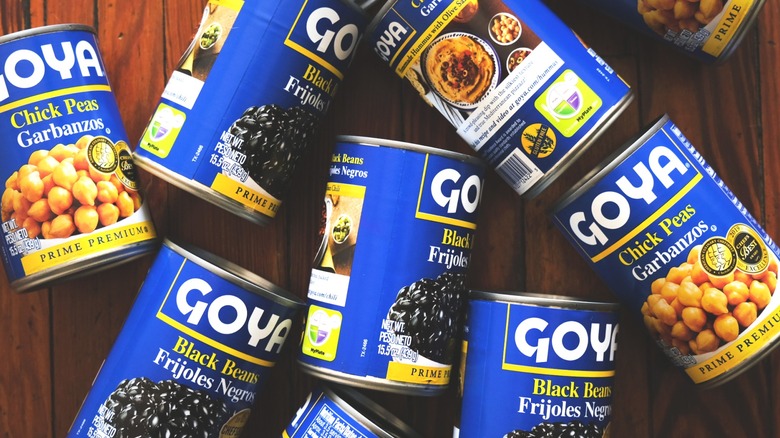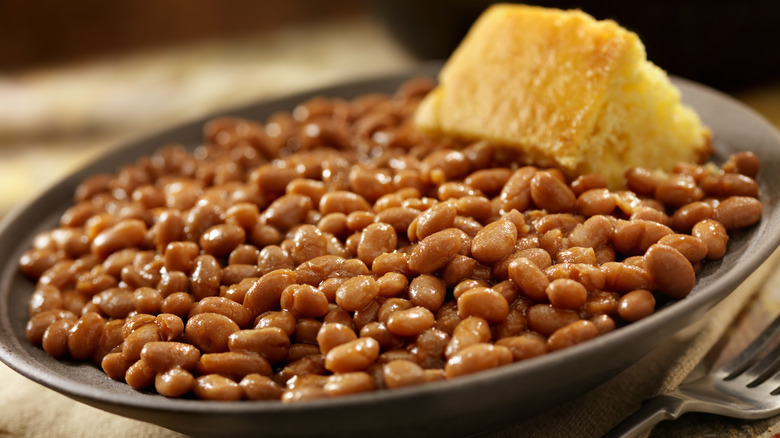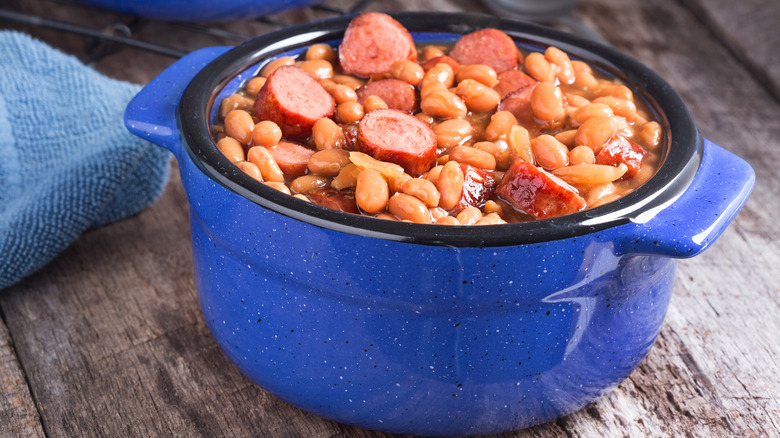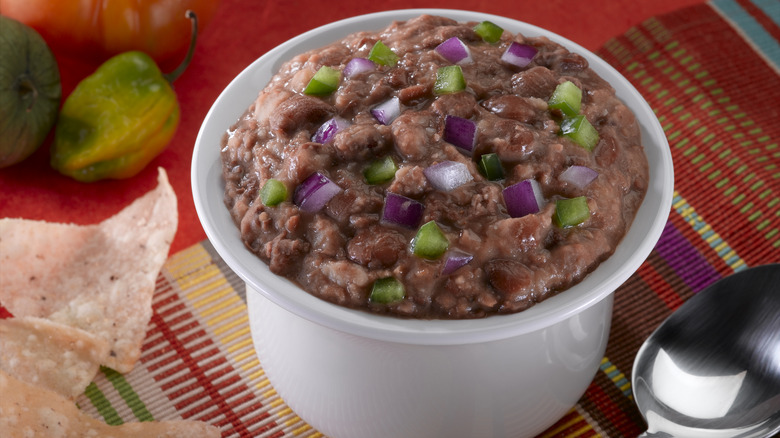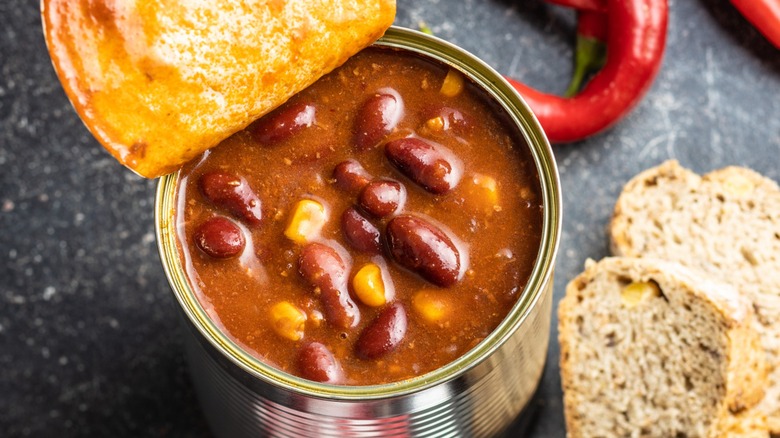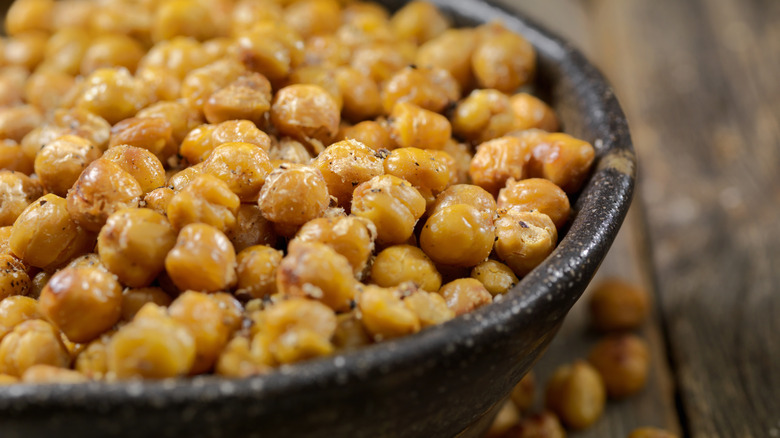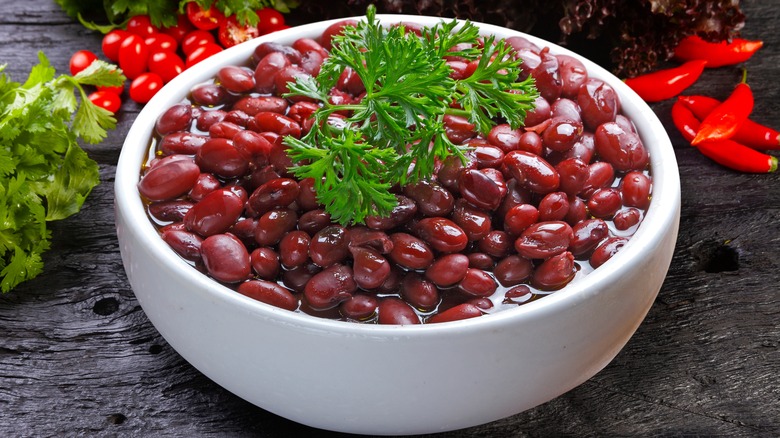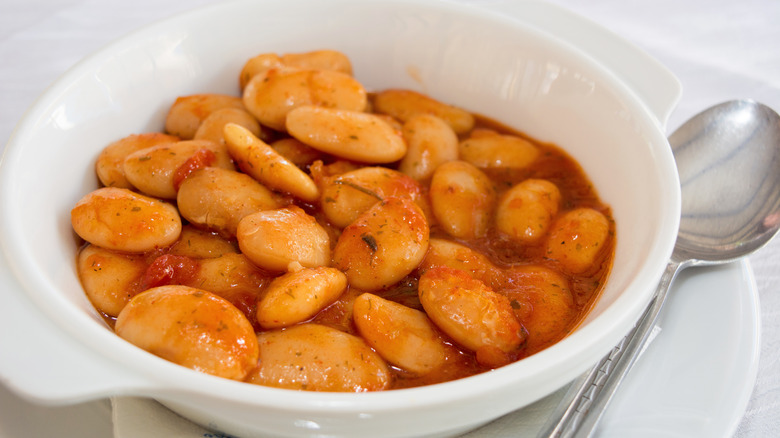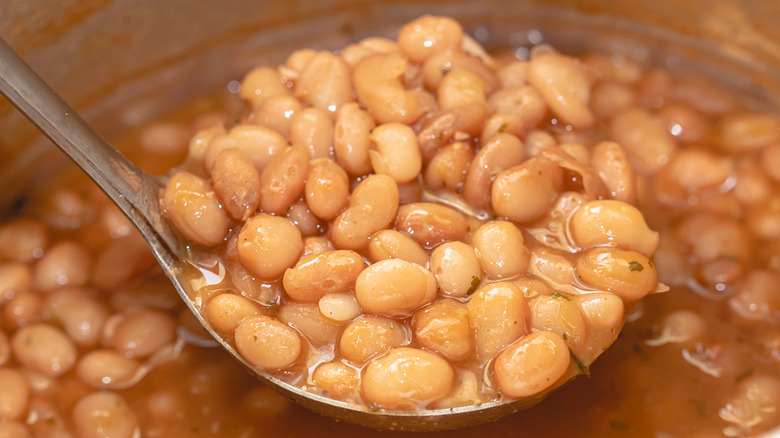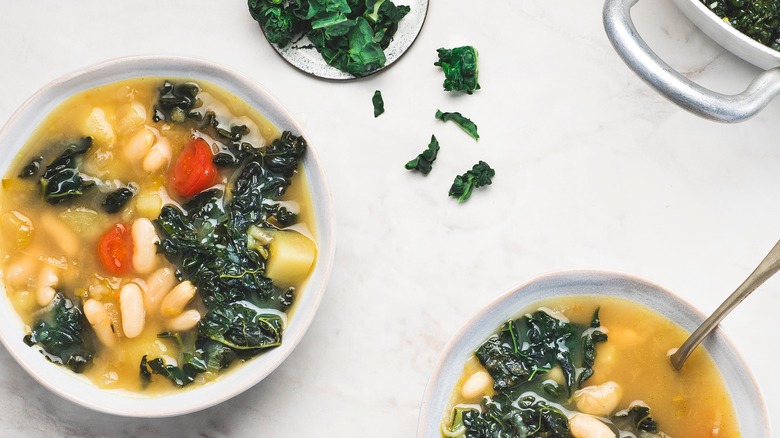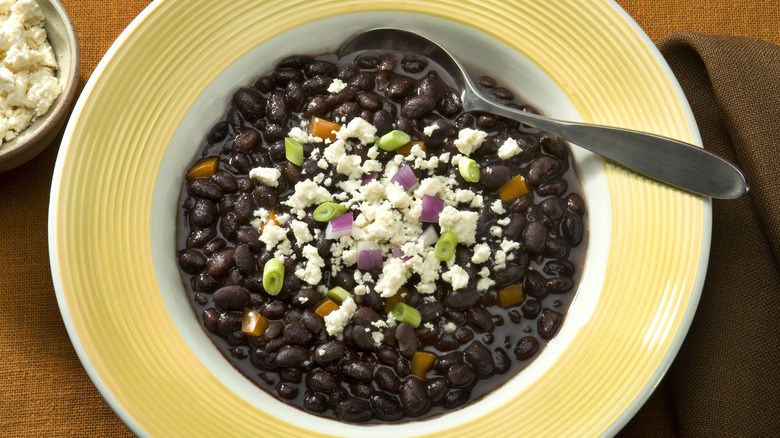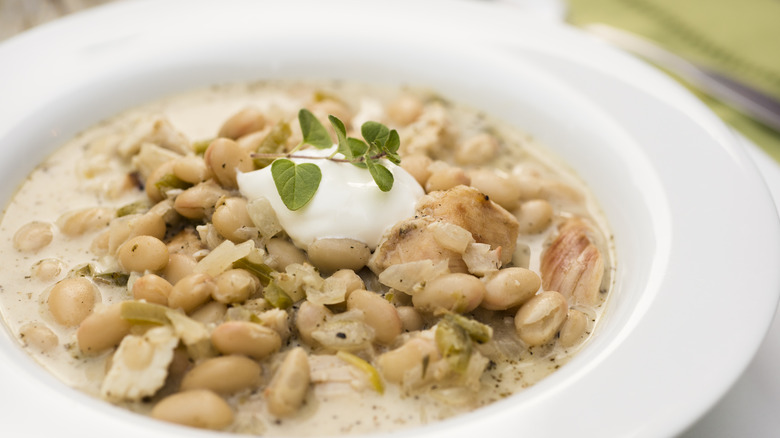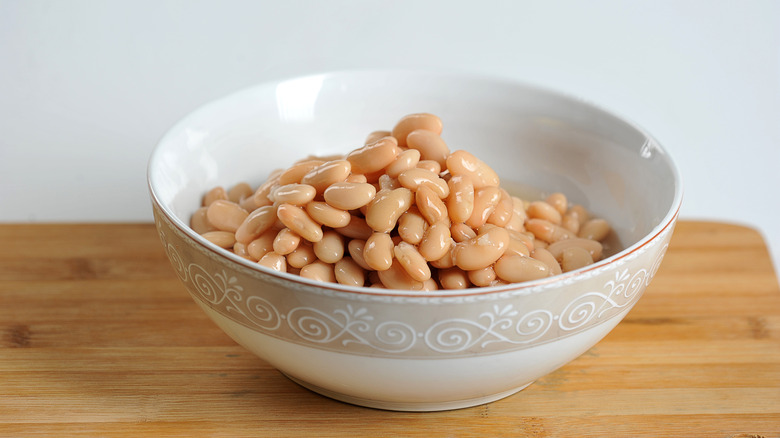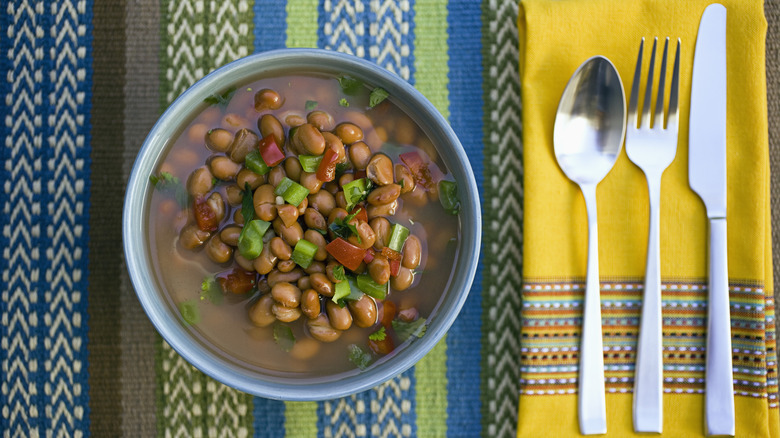4 Unhealthy And 8 Healthiest Canned Beans At The Store
Head to the canned bean section at a grocery store and you'll be presented with a huge range of options. From kidney beans and garbanzo beans to lima beans and pinto beans, there are all kinds of offerings to choose from. Then, there are products such as baked beans, franks and beans, and refried beans that are already seasoned or processed. You might be wondering which are the healthiest and which are downright unhealthy.
Well, the fact is, all canned beans are relatively healthy. Beans — regardless of their variety — are high in protein, rich in fiber, and contain a range of vitamins and minerals. Even the slightly less healthy options still have that nutritional base to work from. So, when we're thinking about comparatively unhealthy beans, it's due to extras such as added sugar, high sodium levels, and the addition of processed meats.
If you're looking to discover which canned beans are nutritionally sound and which are unhealthy, you've come to the right place. We'll go over some popular unhealthy and healthy options. But remember, it's all about balance when it comes to food, so it's fine to eat the less healthy options as part of a varied, balanced diet. Let's look at some of the types of beans available and touch on their nutritional value and health benefits.
Unhealthy: Baked beans
You may have encountered baked beans at a cookout or eaten them as a side dish. Or if you're in the U.K., maybe you eat them on toast. They're usually made with navy beans (also known as haricot beans), which are cooked slowly with various seasonings and ingredients such as molasses, brown sugar, and spices like mustard or Worcestershire sauce.
While baked beans are undoubtedly somewhat nutritious due to the high protein and fiber content from the beans, they are less healthy than regular canned beans due to the additional ingredients they're made with. Many commercial varieties of baked beans contain added sugars. These sugars contribute to the sweet flavor that is characteristic of baked beans, but the sugar content has disadvantages. Excessive sugar intake is linked to various health issues such as heart disease and dental problems.
Another concern with baked beans is the amount of sodium they contain. On average, a serving of canned baked beans contains 19% of the total amount of sodium an adult should eat in a day, according to Healthline. Baked beans can also contain other less-than-ideal additives, such as modified cornstarch and caramel coloring.
Consuming baked beans occasionally as part of a balanced diet shouldn't be a problem. However, if you're watching your sugar or sodium intake, they're not an ideal food. Sometimes, reduced salt and sugar varieties are available in stores. Alternatively, making homemade baked beans allows you to control the ingredients and reduce sugar and salt levels.
Unhealthy: Franks and beans
Franks and beans — or pork and beans — is a classic dish that contains hot dogs (also known as frankfurters or franks) and baked beans. While it's sometimes prepared from scratch, you can also buy ready-made cans of franks and beans. When it comes to canned beans you can buy from the store, franks and beans is one of the more unhealthy options.
Hot dogs, or franks, are often made from processed meat, which can contain additives, preservatives, and high levels of sodium. Processed meats have been linked to an increased risk of certain health problems, including cancer (per the University of Texas MD Anderson Cancer Center).
Both hot dogs and canned baked beans tend to be high in sodium, so when both are contained in one product, it follows that it's high in sodium. Consuming too much sodium can lead to high blood pressure, stroke, and heart disease. And, like baked beans, franks and beans contain high levels of sugar and can contain unwanted additives, meaning it's not the most nutritious meal.
Unhealthy: Refried beans
Whether you eat them as a side, wrapped up in a burrito, or dolloped on nachos, refried beans are a common sight in grocery stores. But what are refried beans? They're made from cooked and mashed beans — usually pinto beans, but sometimes other varieties, such as black beans or kidney beans. These beans are fried or sautéed with onions, garlic, and various spices. Refried beans offer many of the same health benefits as regular canned beans, such as being rich in fiber, protein, and essential nutrients. However, they're less healthy than regular canned beans due to the other ingredients added.
One of the things to be worried about with refried beans is their high sodium content. Just one cup of canned refried beans can contain up to 64% of the recommended daily value of sodium. Traditional recipes for refried beans often include lard, which is a type of rendered pork fat. Lard is high in saturated fat, which can raise levels of LDL cholesterol in the blood and increase the risk of heart disease. While some modern recipes may use vegetable oil instead of lard, you should check the ingredient list before buying so you know what you're working with.
Unhealthy: Chili beans
Chili beans are beans (often red beans) that come in a chili sauce. They provide a shortcut for dishes such as burritos, tacos, or bean chili. This makes them a common choice for people who want to cook at home, but don't always have the time to do so entirely from scratch. This sounds great in theory, but chili beans are unhealthy compared to standard, unprocessed canned beans. This is mostly down to the sodium content. Some chili beans can contain around 20% of your daily value of sodium per serving. While added sugars aren't usually a concern, you might also find some brands with a higher sugar content than you'd expect.
Where possible, it's best to simply make your own chili or taco filling from scratch. This way, you can control the salt and sugar content. However, chili beans are still beans under that salty sauce, so they still have the nutritional benefits you'd expect, such as high protein and fiber.
Healthy: Garbanzo beans
Garbanzo beans, also known as chickpeas, are found in most grocery stores. You can use them in hummus recipes, soups, stews, salads, and so much more. They're rich in a range of nutrients and have several health benefits, including promoting heart health, supporting a healthy colon, and helping regulate blood sugar levels.
Garbanzo beans are an excellent source of dietary fiber, with one cup of cooked chickpeas providing about 9.6 grams of fiber — this is around 30% of your recommended daily intake. Fiber plays a crucial role in promoting heart health and reducing the risk of heart disease. They also contain resistant starch, which is a type of carbohydrate that resists digestion in the small intestine and behaves like dietary fiber. Resistant starch plays a role in regulating blood sugar levels and supporting colon health.
There are plenty more nutrients in garbanzo beans, too. They contain around 11 grams of protein per cup. Protein plays a role in immune health, muscle-building, and maintaining healthy hair, skin, and nails. One cup also contains around 14% of the vitamin B6 and folate you need in a day. Plus, they contain notable quantities of iron, magnesium, manganese, phosphorus, and copper.
Healthy: Kidney beans
Native to Central America and Mexico, kidney beans — sometimes known as red beans — are common in Mexican and other Latin American cuisines. However, they're versatile enough to be used in a range of dishes, from bean burgers to red bean soup. And, while uncooked kidney beans can be toxic, you don't need to worry about that when you buy them canned.
So, why have they landed on our list of the healthiest canned beans? Well, like all beans, they're rich in fiber and protein. Just 3.5 ounces of cooked kidney beans contain nearly 9 grams of protein. The same quantity of beans contains 6.4 grams of fiber. Incorporating them into your diet can help you reach your recommended daily intake of these nutrients.
Kidney beans also contain a wide range of vitamins and minerals. They're rich in folate (vitamin B9), which is important for cell division and DNA synthesis, and is particularly important during pregnancy. Iron is also found in these beans. It's an essential mineral that plays a vital role in oxygen transport, energy production, and immune function. Magnesium is also found in kidney beans and is involved in hundreds of biochemical reactions in the body, including those related to energy metabolism, muscle function, and bone health.
Healthy: Lima beans
Lima beans can be divisive. But love them or hate them, these beans are among the healthiest around. You can buy versions that have been canned fresh and look green or off-green. However, you'll also find white versions that have been dried and cooked before being canned. These are sometimes known as butter beans.
In one cup of canned lima beans, you'll find 12 grams of protein and 9 grams of fiber, both of which are important for functions such as immune health and heart health. When it comes to vitamins and minerals, lima beans are full of manganese — one cup contains 92% of your daily value. Manganese is an antioxidant and is vital for metabolic function.
While lima beans aren't as rich in other vitamins and minerals as they are in manganese, they still contain notable amounts. One cup contains 58% of the daily value of copper, 30% of the daily value of magnesium, and 23% of the daily value of iron. Plus, the same quantity contains roughly 20% of the daily value of potassium, thiamine, vitamin C, vitamin B6, and phosphorus.
Healthy: Pinto beans
Pinto beans are commonly found canned in stores. They're widely consumed in many cuisines around the world, and are particularly popular in Latin American, Southwestern American, and Mexican dishes. Pinto beans are versatile and can be used in a variety of recipes, including soups, stews, salads, chili, and bean-based dips.
They're an excellent source of protein, providing around 16 grams of protein per cup of cooked beans. Protein is essential for building and repairing tissues, supporting immune function, and maintaining muscle mass. Including pinto beans in your diet can help meet your protein needs, especially for vegetarians and vegans. They're also full of fiber, with one cup containing approximately 16 grams of fiber. Fiber is important for digestive health as it promotes regular bowel movements, prevents constipation, and supports a healthy gut microbiome. Additionally, dietary fiber helps regulate blood sugar levels and reduces cholesterol levels.
Notably, these beans are also packed with folate. Each cup provides more than ⅔ of the daily recommended intake for adults. They're also rich in a range of antioxidants. These are great for reducing inflammation in the body and offering cells protection from free radicals. It's possible that antioxidants can reduce the chance of getting cancer and Alzheimer's.
Healthy: Cannellini beans
If you're into Italian food, you've probably come across cannellini beans. Also known as white kidney beans, these beans are large with a mild flavor and a smooth, creamy texture, making them a versatile ingredient in soups, salads, stews, and dips.
Like other beans, they're a rich source of both protein and fiber. One cup of cooked cannellini beans contains 16 grams of protein and about 10 grams of dietary fiber. We should also mention that cannellini beans are one of the best plant-based sources of calcium. One cup of cooked cannellini beans provides almost 120 milligrams of calcium, which is important for maintaining strong bones and teeth, supporting muscle function, and assisting with nerve transmission.
Cannellini beans are also a good source of iron, with one cup providing approximately 7.2 milligrams of iron. You need iron to produce hemoglobin, a protein in red blood cells that carries oxygen from the lungs to the rest of the body. Adequate iron intake is essential for preventing iron deficiency anemia and maintaining overall health and energy levels.
Healthy: Black beans
Common in Latin America, Caribbean, and Southwestern American cruising, black beans are known for their rich, dark color and dense, meaty texture. They're often used in tacos and burritos, stews, soups, dips, and more. There are many reasons to eat black beans, aside from the taste. It should come as no surprise that black beans contain healthy amounts of protein and fiber. One cup of cooked black beans contains roughly 16 grams of protein and about 12 grams of fiber. They're also a good source of iron, with one cup providing approximately 6 milligrams of iron, which is about 34% of the daily value.
Black beans have a relatively low glycemic index (GI), which means they are digested and absorbed slowly, leading to gradual increases in blood sugar levels. Foods with a low GI are beneficial for managing blood sugar levels and reducing the risk of insulin resistance, type 2 diabetes, and other metabolic disorders.
What's more, these beans contain antioxidants called anthocyanins, which are responsible for their dark color. Anthocyanins have been linked to various health benefits, including reducing inflammation, protecting against oxidative stress, and improving cardiovascular health. Consumption of anthocyanin-rich foods like black beans may help reduce the risk of chronic diseases such as heart disease and some types of dementia.
Healthy: Great northern beans
Great northern beans are a type of white bean that is creamy in texture with a mild flavor. This mild flavor means they're great in a variety of dishes, including soups, stews, dips, salads, and casseroles. If you've been paying attention, you'll know that all kinds of beans are chock full of fiber and protein, and these beans are no exception. One cup of cooked great northern beans contains 14 grams of fiber and 16.6 grams of protein. They also contain a type of antioxidant called flavonoids, which can reduce the risk of cardiovascular disease.
Eating a cup of great northern beans will give you around half of your recommended daily intake of folate. Additionally, you'll get about ⅓ of your daily phosphorus needs and over half of your recommended manganese intake, which is important for supporting the nervous system and brain health. These beans are also rich in iron, thiamin, magnesium, and copper. They also offer smaller amounts of calcium, vitamin B6, zinc, and selenium as well.
Healthy: Navy beans
If you've eaten baked beans, you've probably consumed navy beans, even if you don't know it. They're also known as haricot beans, and are small, oval-shaped white beans with a soft, creamy texture. You can use them in all kinds of dishes, including soups, stews, dips, and homemade baked beans. Navy beans are similar to great northern beans, but not exactly the same.
One cup of cooked navy beans contains approximately 19.2 grams of fiber and 15 grams of protein. These beans are also rich in potassium, providing about 32% of the recommended daily value per cup. Potassium is an essential mineral that helps regulate blood pressure, maintain fluid balance, and support proper nerve and muscle function, so it's important stuff. Other nutrients found in navy beans in smaller quantities include folate, iron, zinc, magnesium, and calcium. These nutrients play various roles in the body, such as supporting red blood cell production, promoting bone health, and maintaining immune function. We should also note that navy beans are high in resistant starch — a type of carbohydrate that resists digestion in the small intestine. It's good for your health in several ways, including improving insulin sensitivity and supporting gut health by serving as food for beneficial gut bacteria.
Methodology
To put together this article, we compared the nutritional information of a variety of popular types of canned beans that you can buy at the store. By comparing this empirical data, we could find the healthiest beans and some of the most unhealthy. We looked at information from university departments and articles written or reviewed by registered dieticians or medical professionals.
